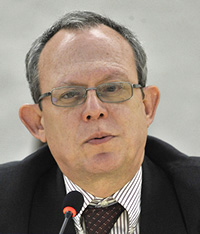
Last week, the UN Special Rapporteur on the promotion and protection of the right to freedom of opinion and expression presented his report to the UN Human Rights Council concerning “the implications of States’ surveillance of communication on the exercise of the human rights to privacy and to freedom of opinion and expression.” These rights have their roots in the International Covenant on Civil and Political Rights (ICCPR) and myriad other human rights treaties, such as the American Convention on Human Rights and the African Charter on Human and Peoples’ Rights, among others.
Presentation of the Special Rapporteur’s report coincided with breaking news that the U.S. government is reportedly obtaining the “phone records of millions of Verizon customers daily” and “tapping directly into the central servers of nine leading U.S. Internet companies” through a covert surveillance program know as PRISM under the direction of the U.S. National Security Agency.
Securing the Right to Privacy and Freedom of Expression
Even with judicial oversight, States’ engagement in widespread surveillance of private communications in the name of national security may violate individuals’ human rights. And although human rights treaties permit States to restrict the rights to privacy and freedom of expression when necessary to protect national security or public safety, as the Special Rapporteur notes, these treaties provide little concrete guidance to States on when such a derogation is permissible. United Nations treaty bodies, regional human rights mechanisms and the Special Rapporteur therefore play crucial roles in defining when international law permits States to infringe on individual privacy.
In this most recent report, the Special Rapporteur proposes adapting a test initially formulated by the Human Rights Committee in General Comment 27, addressing when a derogation from the State’s duty to protect freedom of movement may be permissible. The test lays out the following requirements:
“Any restriction must be provided by the law…;”
“The essence of a human right is not subject to restriction …;”
“[The] Restriction must be necessary in a democratic society…;”
“Any discretion exercised when implementing the restrictions must not be unfettered …;”
The restriction “must be necessary for reaching the legitimate aim…;” and
“Restrictive measures must conform to the principal of proportionality….”
This standard is similar to that used by the European Court of Human Rights. For examples, see the European Court’s caselaw factsheets on Protection of Personal Data and Hate Speech.
An Evolving Dilemma: Communication Surveillance and Technological Developments
The Special Rapporteur asserts that while national security may warrant surveillance of personal communications in certain circumstances, “national laws regulating what would constitute the necessary, legitimate and proportional State involvement in communications surveillance are often inadequate or non-existent,” thereby creating a high risk that human rights are trampled without sufficient justification. He also observes that while surveillance was initially considered in some domestic systems to be acceptable on only an extremely limited basis (citing the U.S. Supreme Court’s “reluctant” sanction of wiretapping in Olmstead v. United States, 277 U.S. 438 (1928)), countries across the globe have expanded their use of surveillance technology, with national legislators or the executive branch of governments deeming surveillance appropriate in a wider variety of circumstances under a broadening definition of “national security.”
Further, as the costs for obtaining and storing data have sharply declined, States are no longer as constrained on a practical level as they once were. States may now more easily target communications via email or mobile phones of either specific individuals or an entire national populace. Advances in technologies also allow States to more easily monitor and censor on a massive scale the expression of opinions deemed dangerous or inappropriate, restricting individuals’ freedom of expression.
Recommendations for Protecting the Right to Privacy and Freedom of Expression
The Special Rapporteur identifies several means for ensuring that privacy and free expression rights are protected. The central recommendations are that all States should:
- “update[e] and strengthen … laws and legal standards” by employing the suggested test (see above) for ensuring government surveillance is only permitted in truly exceptional situations. Further, States must notify individuals whom they monitor.
- “Facilitate private, secure, anonymous communications” by not requiring individuals to give identifying information in order to access the internet or to use mobile phones. States also “should not require the retention of particular information purely for surveillance purposes.”
- “Increase public access to information” so that the public better understands how and when their privacy is at risk. This will allow individuals to evaluate for themselves what information to make available and in what forums.
- “Regulat[e] the commercialization of surveillance technology.” Noting that private companies can also violate individuals’ rights to privacy and free expression, the Special Rapporteur affirms that States must hold private companies to the same high standards to which they should hold themselves when it comes to collecting and retaining private information.
Finally, the Special Rapporteur calls on all human rights mechanisms, chiefly the Human Rights Committee, which monitors State compliance with the ICCPR, to tackle the issue of surveillance in relation to recent technological advances as necessary for ensuring the relevant human rights protections keep apace.
